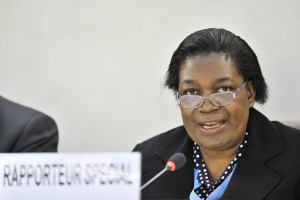
A major issue of concern raised at the recent meeting of NGOs the High Commissioner for Human Rights, Navi Pillay was the growing threat of reprisals against human rights defenders which has lead to a deep concern for the safety and protection of human rights defenders and their families worldwide.
The United Nations Special Rapporteur on human rights defenders, Margaret Sekaggya (pictured) , also expressed her concerns regarding violations against human rights defenders in the United Nations Human Rights Council where she presented her report during the current session.
Sekaggya stated that ‘defenders can play a key role in safeguarding democracy and ensuring that it remains open, pluralistic and participatory and in line with the principles of rule of law and good governance,’ however it is evident that human rights defenders in various countries are shrinking in numbers due to the risks they are exposed to. Human rights defenders are increasingly being subject to a range of threats including criminalization, arbitrary arrest and detention, torture and killings. Freedom of expression and association are also limited. These developments affect society as a whole and create an environment built on fear.
Sekaggya joined other UN experts in expressing dismay at the recent death of Chinese human rights defender, Cao Shunli. In September 2013, Cao Shunli was detained by Chinese authorities as she was about to depart for Geneva as a result of her role in organizing a series of peaceful protests, demanding greater civil society participation in China. She was denied proper medical treatment while in detention and her health continued to deteriorate. She was finally transferred to a hospital in a critical condition where she died shortly after. The death of Cao Shunli has been deplored by the international community which has called for a full investigation.
The right to freedom of expression and opinion are also under threat in under parts of the world. Protests in Venezuela have lead to claims of arbitrary detention of protestors and journalists and excessive use of force such as torture and beatings. There is also increasing violence, intimidation and attacks on journalists, especially in areas of conflict. In some states, such as Ethiopia, anti-terrorism laws are being used to curb freedom of expression and crush dissent. This law incorporates extreme measures to limit dissent, including prison sentences.
Recently, two prominent human rights activists Ruki Fernando and catholic priest Fr Praveen Mahesan were arrested under Sri Lanka’s Prevention of Terrorism Act and charged with attempting to create instability among communities and cause disturbance. Both men are well known in human rights circles and work with victims of war in particular. Following an international outcry and the raising of the issue at the Human Rights Council meeting in Geneva, the two men were released after three days detention.
The participation of civil society; including individuals, protestors and human rights defenders, is essential for the future of human rights as well as society’s
adherence to international human rights obligations. However, it is also the State’s responsibility to ensure that human rights defenders are protected and that they can promote the rights of other people and themselves.